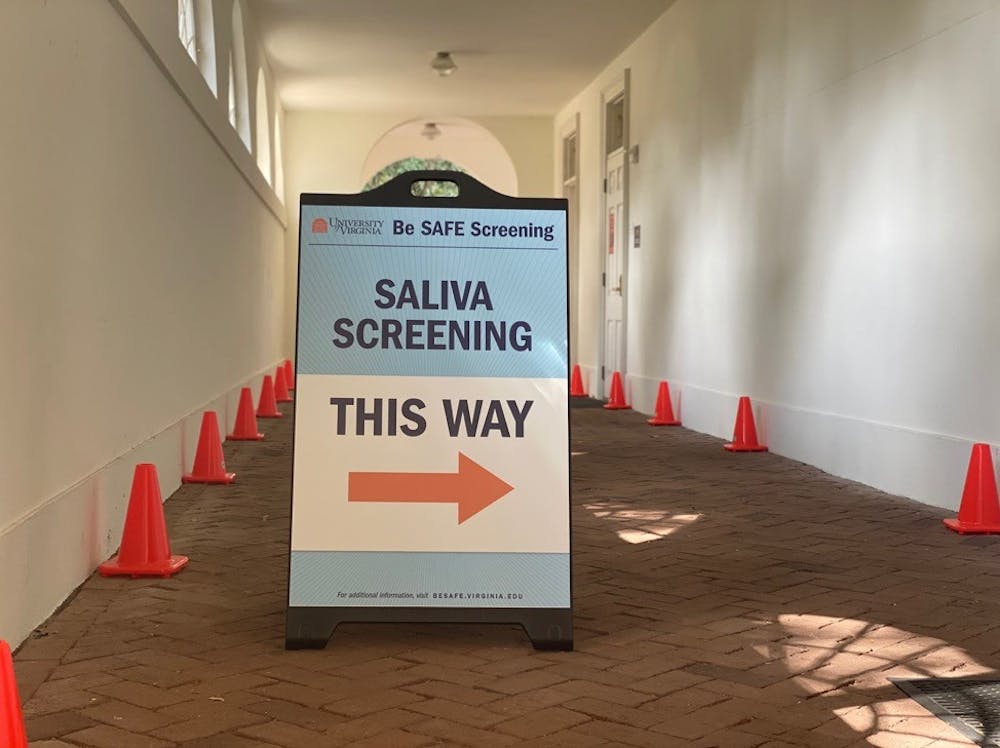It’s been almost two years since doctors developed a vaccine to mitigate the deadly consequences of COVID-19, restoring a sense of normalcy to our lives. Despite the high efficacy of this technology, COVID-19 remains a threat to our lives — stubbornly refusing to wave the white flag of surrender. This is especially true in Charlottesville, where the Centers for Disease Control categorizes the area as having a high community level of COVID-19 — recommending those with symptoms to get tested. As such, the University must reinstate its free COVID-19 saliva testing program and tracker website in order to ensure the safety of all Charlottesville community members.
In an email sent to the community last March, University leadership announced it would lift the requirement for unvaccinated students to test weekly and phase out its saliva testing program. Phasing out the saliva testing program was the University’s first mistake. This optional testing program was available to students experiencing symptoms last fall, allowing them to take necessary precautions to stop the spread of COVID-19. In June, the University stopped updating its COVID-19 tracker due to low case counts and hospitalizations in the Charlottesville community. The tracker had been in commission since August 2020, reporting key health statistics like case counts, hospitalizations and positivity rates. Discontinuing the COVID-19 tracker was its second mistake. In the place of once-live statistics, the University directs viewers to the CDC’s website which outlines “preventative steps to take.” Yet funnily enough, the CDC’s website recommends the Charlottesville community be tested if exhibiting symptoms. It is blatantly obvious The University does not care as it once did about the way that COVID-19 affects student life and the Charlottesville community — its hypocrisy makes that much clear.
It would seem the University lacks common sense — or maybe common decency — in its actions. Using low case counts and hospitalizations as justifications are just half-hearted excuses that fail to address the rise in COVID-19 cases Charlottesville experienced this past week. The University’s assertion of low case counts is alarming, seeing as the Virginia Department of Health says otherwise. More seriously, the side effects of death and other dangerous health problems did not magically disappear in the face of vaccine rollouts and lowering positivity rates. By removing saliva testing and the tracker website, the University is denying the community access to life-saving — or threatening — information.
This is an issue of inadequate information accessibility, but it is also an issue of equity. While the University once offered free saliva testing on Grounds, it now only offers PCR tests for purchase from the Student Health Center. So, instead of students having the ability to test freely and quickly at a nearby testing spot, they must now make the trek across Grounds to the Student Health Center, where they then must pay to be tested. It is wrong of the University to simply assume all students can afford this change. To call this new process an inconvenience is an understatement — it is inconsiderate, and neglects students who may not have additional money to buy a test. There should not be financial barriers to obtaining information that affects the wellbeing and safety of students, and the community as a whole. Students already have enough responsibility on their plates — paying for COVID-19 testing should not be one of them.
University leadership assured students last March that “if viral conditions change substantially, we will always be ready to change our approach in order to keep our community safe.” I do not think I am overstepping when I say that viral conditions are changing substantially. It is time to change our approach — or rather, revert to the previous approach of taking necessary precautions to ensure the safety of our community.
We did not apply to college with the anticipation that a global pandemic would steal the show, affecting every aspect of our time here. Alas, it did happen. And while most Virginians are vaccinated and face weaker COVID-19 symptoms, this does not change the fact that COVID-19 is still prevalent in our community. These errors must be rectified immediately. At the very least, we are owed assurance that our lives and wellbeing are prioritized here on Grounds.
Grace Duregger is an Opinion Columnist for The Cavalier Daily. She can be reached at opinion@cavalierdaily.com.
The opinions expressed in this column are not necessarily those of The Cavalier Daily. Columns represent the views of the authors alone.







